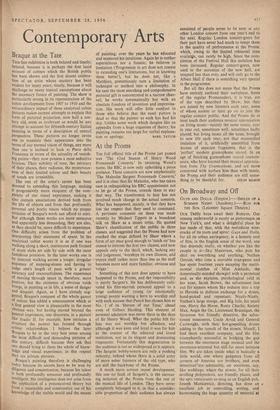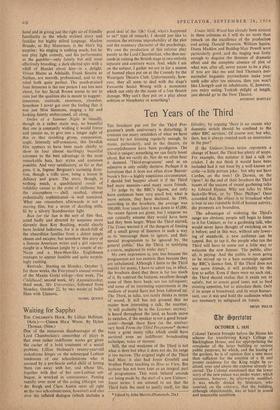On Broadway and Off
GUYS AND DOLLS. (Empire.)-SMILES OF A SUMMER NIGHT. (Academy.)—RuN FOR THE SUN. (Leicester. Square Theatre.) OUR Teddy boys await their Runyon. Our unsung underworld is surely as picturesque, as New York's, and what a delightful place he has made of that, with the melodious wise- cracks of its touts and spivs! Guys and Dolls, for all its urban astringency, is a homely sort of film, in the English sense of the word, one that depends, really, on whether you like the people in it—Sky Masterson, who puts his shirt on everything and anything; Nathan Detroit, who runs a movable crap-game and has spent fourteen, years escaping the matri- monial clutches of. Miss Adelaide, the domestically-minded showgirl with a perpetual and, as she explains, psychological cold in her nose; Sarah Brown, the salvationist lass out for sinners whom Sky seduces into a trip to Havana in dubious exchange for a dozen, hand-picked and repentant; Nicely-Nicely, Nathan's large stooge, and Big Jule, his small one, Harry the Horse, Rusty Charlie, Society Max, Angie the Ox, Lieutenant Brannigan, the ferocious but friendly detective, the salva- tionist missioners, Uncle Arvid and General Cartwright, with their hot-gospelling drums adding to the tumult of the streets. Myself, I find them excellent company, and the film triumphantly successful in bridging the gap between the enormous stage musical and the enormous-screened but still far more intimate film. We are taken inside what is basically a little world, one where gangsters from all corners of America are brothers, and even detectives are 'admissible, on occasions, say, like weddings; where the streets, for all their strolling pickpockets, are friendly places, and the spiv restaurants as snug as an English pub. Joseph Mankiewicz, directing, has done an 4, excellent job in controlling, sorting, and harmonising the huge quantity of material at
hand and in giving just the right air of friendly familiarity to the whole stylised story and familiar but highly stilted language. Marlon Brando, as Sky Masterson, is the film's big surprise: his singing is nothing much, but he can play light comedy, and his performance as the gambler—only faintly but still most effectively brooding; a dark-shirted spiv with a whiff of Hamlet about him—is a delight. Vivian Blaine as Adelaide, Frank Sinatra as Nathan, are smooth, professional, and to my mind both quite perfect. The much-praised Jean Simmons is the one person I am less sure about, for her Sarah Brown seems to me to miss just the qualities she is meant to suggest: innocence, rectitude, sweetness, abandon. Somehow I never got over the feeling that it was just Miss Simmons, singing a bit and looking faintly embarrassed, all along.
Smiles of a Summer Night is visually. though in a rather static way, so beautiful that one is constantly wishing it would freeze and remain so, to give one a longer sight of this or that ravishing group, composition, angle. Intensely self-conscious, this Swedish film appears to have been made chiefly to show its four almost startlingly beautiful actresses to the best advantage in the most remarkable hats, hair styles and costumes possible. And very satisfactory, as far as that goes, it is, Ingmar Bergman's caressing direc- tion, though a trifle slow, being a lesson in delicacy and grace. The story, though, is nothing much, a quadrilateral ronde of infidelity casual to the point of dullness; but the atmosphere — chill, rarefied, almost pedantically sophisticated—is well sustained. What one remembers afterwards is not a moving film, but a series of dazzling stills, lit by a silvery Scandinavian light.
Run for the Sun is the sort of film that, acted badly and directed by someone more slovenly than Roy Boulting, would clearly have look(•d ludicrous, for it is chock-full of the absurdities familiar from a dozen jungle chases and escapes; but somehow this story of a famous American writer and a girl reporter caught in a Mexican jungle by a couple of ex- Nazis and a Haw-Haw-tike Englishman manages to appear feasible and quite surpris- ingly exciting.
Revivals: Starting on Monday, October 1, for three weeks, the Everyman's annual revival of the Maxim Gorki trilogy—first week, The Childhood; second week, My Apprenticeship; third week, My Universities; followed from Monday, October 22, by two weeks of ballet films with Ulanova.
ISABEL QuiGLy



































 Previous page
Previous page